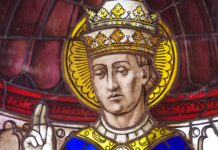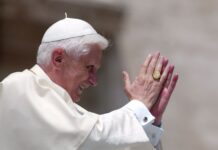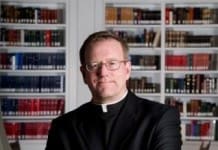Yesterday, Pope Emeritus Benedict XVI’s biography entitled Benedict XVI: A Life was published in Germany. It’s final chapter contains a previously unpublished interview given by the pontiff emeritus in Fall of 2018.
In the interview, Benedict XVI spoke on what he meant at his papal inauguration in 2005 when he asked the Faithful to pray for him so “that I may not flee for fear of the wolves” – saying he was not referring to internal Church matters such as the “Vatileaks” scandal in 2011.
“Of course, issues such as ‘Vatileaks’ are exasperating and, above all, incomprehensible and highly disturbing to people in the world at large.”
He said the true threat to the Church instead was modern society forming an “anti-Christian creed” carrying the punishment of “social excommunication.”
“But the real threat to the Church and thus to the ministry of St. Peter consists not in these things, but in the worldwide dictatorship of seemingly humanistic ideologies, and to contradict them constitutes exclusion from the basic social consensus. Events have shown by now that the crisis of faith has above all led to a crisis of Christian existence. The fear of this spiritual power of the Antichrist is therefore only too natural, and it truly takes the prayers of a whole diocese and the universal Church to resist it.”
He added that opposing same-sex marriage, abortion, and laboratory fertilization of human eggs receives the same punishment of social excommunication.
“A hundred years ago, everyone would have thought it absurd to speak of homosexual marriage. Today whoever opposes it is socially excommunicated. The same applies to abortion and the production of human beings in the laboratory.”
In the interview, Benedict XVI also spoke on why he resigned the pontificate in 2013, saying it became clear to him that with possible dementia, “other forms of insufficient ability to hold office properly are also possible.” He said he signed a conditional declaration of resignation “relatively early” in his pontificate “in the event of illness which rendered the proper performance of duties impossible.”
He also commented on the criticism of his resignation, saying the office of “papa emeritus” he created is comparable to a bishop who resigned because of age, a legal status that should also apply to the Bishop of Rome. He said it prevented “any notion of a coexistence of two popes: a diocese can have only ONE incumbent – at the same time, it expresses a spiritual bond that can never be taken away.” He compared his situation to that of an old farmer in Bavaria who passed his farm to his son, and now lives in a small house next to it, ceding any rights to authority over it.
He also denied any accusations of interfering with Church matters since his resignation, saying it was a “malicious distortion of the truth,” hinting at “reasons why people just want to switch off my voice.”
“I would rather not analyse the actual reasons why people want to silence my voice.”
Currently, his biography is only available in German but n English translation, “Benedict XVI, The Biography: Volume One,” will be published on the 17th of November in the United States.

















